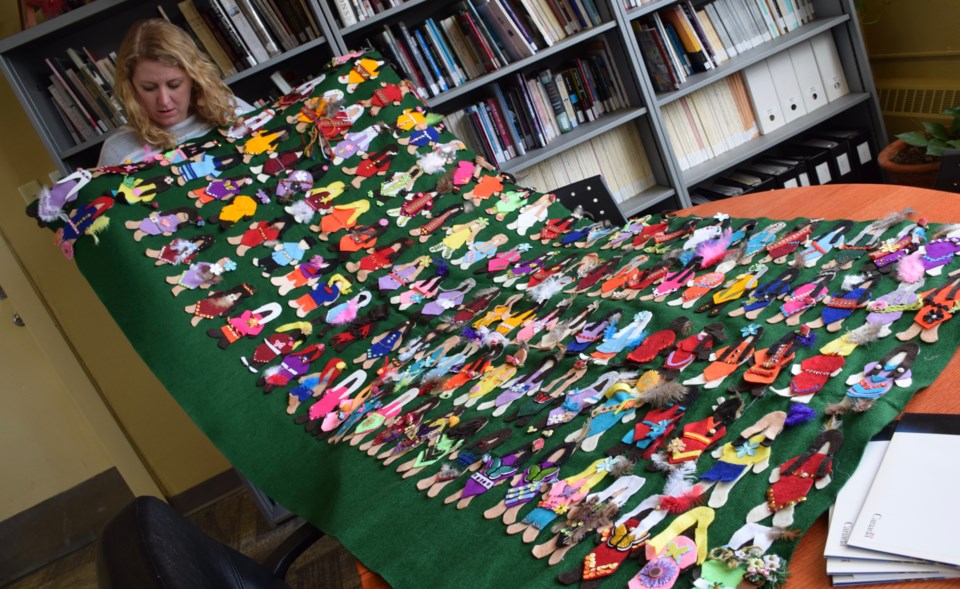A large “faceless doll” blanket - beautiful, elaborate, and sad all at the same time - will be exhibited at the upcoming Truth and Reconciliation Circle at the eBar on Quebec Street.
The winter gathering, put on by local groups, will have a focus on Indigenous authors and artisans. It happens throughout the day on Sunday, Mar. 19, starting at 11 a.m.
Maria Shallard is the coordinator of aboriginal programs at the Aboriginal Resource Centre at the University of Guelph. She brought out the blanket during an interview Wednesday at the centre, explaining that it is a work in progress, with several hundred faceless figures on it.
The blanket is part of a local contribution to the National Women’s Association of Canada’s Faceless Doll Project. In honour and memory of more than 600 missing and murdered Aboriginal women and girls in Canada. Many of the blankets will become part of a travelling art exhibition.
“It’s a winter gathering to bring people together in the community, to strengthen our relationships in Guelph,” Shallard said. The event will start with a traditional ceremony and teaching by drummer and story-teller Jan Sherman.
Laurie Graham, Canadian poet, editor, teacher and the publisher of Brick magazine, will be the special guest author and speaker. Her books include Rove, and Settler Education, which was published last year by McClelland and Stewart.
The poems in the recent volume explore the Plains Cree uprising of 1885 at Frog Lake in what is now Saskatchewan, where nine settlers were killed and six Cree warriors hung. It was a time of rapid and unbridled settlement on the prairies.
“Anyone can come and listen to Laurie speak and read her poems,” Shallard said.
There will be traditional food tasting, catered and hosted by Grassroots Catering. A number of Indigenous foods will be part of the cuisine. And there will be craft-making materials on hand for the younger people.
After lunch, there will be film screenings, including Ame Papatsie’s Qalupalik, a product of the Nunavut Animation Lab. It tells the legend of a part-human sea monster that lives deep in the Arctic Ocean, and preys on children who do no listen to their parents or elders. The animation utilizes multi-coloured leather shapes to create the scenes.
Shallard will host the Faceless Doll Exhibit component of the event. She said each doll is made to have its own unique features, in recognition of the uniqueness of each of the missing or murdered women and girls.
“We will end in the afternoon with community sharing circles and teachings with Jan Sherman,” she said. Those circles involve a lot of open conversation and “speaking from the heart.”
There have been a number of such gatherings in Guelph in recent times, all of them richly intergenerational. Up to 100 people attend, and many in the community support them.
“It’s a collaborative process with Indigenous people welcoming everyone to come, join, and learn from one another,” Shallard added.
Guests will have an opportunity to learn about the truth and reconciliation process, and will be encouraged to support the many First Nations, Inuit and Métis authors we have. Doing so is a way of uplifting Indigenous people.
“A part of strengthening relationships is supporting Indigenous people, and especially Indigenous authorship,” Shallard said. “If people come to the event we want them - if they can, if they’re able and can afford it – to support the authors and buy a book.”
The Bookshelf will have a number of books on hand by Indigenous authors, and Laurie Graham will be on hand to sign copies of her books.
The Truth and Reconciliation Commission issued its final report in 2015, outlining a series of 94 calls to action. Learn about them here.
“I see more people wanting to understand what truth and reconciliation is,” Shallard said. “It’s important that as people start to learn about it, they don’t place too strong a demand on Indigenous people that are working on their own healing.”
